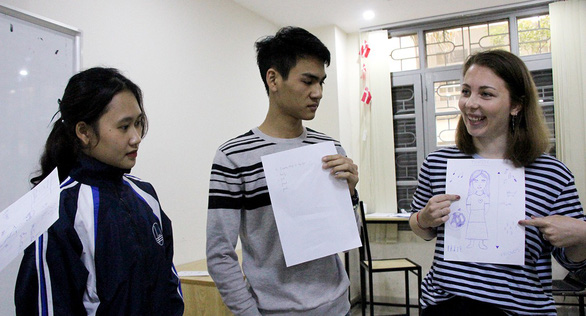Foreigners help Vietnamese students overcome a fear of English

Danish volunteer Alberte Hogh (right) considers herself a friend to her students. It helps them feel more comfortable and less shy while practicing English speaking skills, she says. Photo: Ha Thanh / Tuoi Tre
A fear of foreign languages, particularly English, seems to be endemic amongst Vietnamese students, but the University of Social Sciences and Humanities (USSH Hanoi) is hoping to empower its students by offering free English classes to those looking for the opportunity to improve their speaking skills and build their confidence.
The free classes, taught entirely by a group of foreign volunteers, have so far helped over 500 students overcome their fear of communicating in English and the organizers couldn’t be more thrilled at the results.
Effective course
The free course is hosted by USSH Hanoi and the Center for Sustainable Development Studies (CSDS), a non-governmental organization which aims to further sustainable development through community-based interventions.
While the classes are taught by foreign volunteers, a small group of USSH Hanoi students contributes to the program by acting as coordinators between the learners and teachers, organizing the classes, and ensuring the quality of the program.
Students accepted into the program are able to enroll in one of two levels - beginner and advanced, and each class limited to 20 learners in order to ensure that everyone is able to interact with the teachers, according to Nguyen Thu Hao, one of the program’s coordinators.
Regardless of the level, however, the course aim is simple – help students improve their speaking skills and motivate them to improve their overall English abilities.
Classes are held four days a week - from Monday to Thursday - with one in the morning and another in the afternoon.
The only requirement for students to be accepted is a deposit of VND200,000 which is used help guarantee attendance. The deposit is returned to students who finish the course with three or fewer absences.
In Vietnam, university students are required to obtain the B1 certificate on the Common European Framework of Reference for Languages scale in order to graduate.
“Many of them are good at grammar and reading, but when it comes to speaking, they struggle,” Hao said, adding that the free program was designed around the students’ specific needs and has done a great job of meeting them.
Cao Quang Duy, a student in the course, attributes his success to a mixture of the personal goals he’s set for himself and the motivating lessons his teachers plan for each class.
“I set a goal of learning 200 new words this week. Next week I’ll focus on grammar,” he said.
Duy said the foreign teachers each have different personalities and ways to motivate students.
“Excitement in the classroom makes it easier for us to remember the material compared to traditional ways of learning with papers and pens,” he shared.
Fear is the enemy
The two primary volunteers – Alberte Hogh, a 19-year-old Dutch woman, and Julien Ert, a 22-year-old from France – do their best to explain to students exactly how important confidence is when learning a new language.
Hogh, for example, takes a gentle approach to each class, beginning each lesson by gently asking her students “Are you ready?” to which they reply “yes” in chorus.
“Most of the students in the class are quite shy when they interact with foreigners. That’s a barrier in learning a language,” said Hogh, who goes by ‘Birdy’ with her students.
Understanding this problem, Birdy and other volunteers incorporate exciting activities which they hope will help their students overcome their embarrassment and break free from their inhibitions.
Actively participating in the activities, not being afraid of making mistakes, and occasionally using body language are simple ways to avoid fear, according to Ert.
“If one can overcome these challenges at the beginning, they’ll have greater success studying a new language,” he said.
The two teachers also make sure their students understand that the biggest enemy barrier to learning English is a fear of the language.
“At first I was really scared of talking in English because my English is so bad,” said Tran Ngoc Anh, a tourism and hospitality student at USSH Hanoi.
“While attending the class, I realized that the most important thing is feeling comfortable while interacting during games and class activities. That’s helped me build more confidence in my speaking,” she said.
VNF ( TTO )
Recommended
 National
National
Vietnam News Today (Jun. 4): Vietnam - Promising Candidate for Southeast Asia’s Next Powerhouse
 National
National
Shangri-La Dialogue 22: Vietnam Highlights Some Issues of Ensuring Stability in a Competitive World
 National
National
Vietnam News Today (Jun. 3): PM Pham Minh Chinh to Attend UN Ocean Conference, Visit Estonia, Sweden
 National
National
Vietnam News Today (Jun. 2): Vietnamese Trade Mission Sounds Out Business Opportunities in United States
 National
National
Vietnam News Today (Jun. 1): Vietnamese, Japanese Firms Foster Partnership
 National
National
Vietnam News Today (May 31): Vietnam Strongly Supports Laos’s National Development
 National
National
Vietnam News Today (May 30): Vietnam, Venezuela Reinforce Ties Through People-to-people Diplomacy
 National
National


